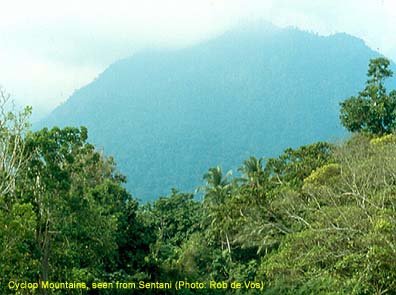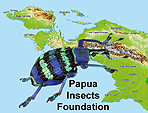

Papua-Insects.nl
The Papua Insects Foundation
Cyclop Mountains
The Cyclop Mountains are a relatively small range of rather high mountains (highest peak 2158 meter) in the Northeast of Papua. It is an official National Park, but it is not clear where this park should begin or where it ends. At the foot of the mountains it imperceptibly changes in urban area. The disadvantage of large cities in the neighbourhood is obvious. Pollution, busy traffic and a high pressure of recreation are deadly for the flora and fauna in the mountains. Nevertheless there are many interesting insects to be found in the area. Very striking is the dominant presence of the large Lake Sentani, with its extremely irregular coastline and deep waters. In the geological past Lake Sentani used to be a saltwater bay, but due to tectonic movements the "island of Cyclops" pushed itself on the coast of Papua, closing the entrance to sea. During the Second World War the American army cleared most of the hill tops around Lake Sentani to avoid sudden attacks by the Japanese. Since then the forest never recovered and the hills still show their bare tops. Fortunately the Cyclop Mountains were spared.
Base of map by onearth.jpl.nasa.gov (modified with geographic names by Papua-Insects)
for an empty map with clear view click here
Major cities in the neighbourhood of the Cyclops are the capital city Jayapura, the airport city Sentani and the university cities Waena and Abepura. The cities are growing fast and take their toll of nature. However, fortunately there are some refugia of lowland rainforest left near Waena and Jembatan Dua. The mountain slopes are still rather undisturbed, but there is another danger. Immigrants from the interior (i.e. Wamena), used to logging, clearing the land and burning the forest for their own use, do not care about restrictions and laws of protection. Moreover, the authorities hardly care about these illegal logging and burning, even in the vicinity of larger cities. A maybe even devastating effect on the fauna is about to come since people released some Java monkeys in the mountains! New Guinea originally has no monkeys or large mammal predators. Introduction of such strange animals in the already fragile ecosystem of New Guinea will be disastrous, bringing strange diseases and unnatural predation and concurrence pressure on the population of indigenous animals.
Hollandia (Jayapura) being the capital city was one of the most regular visited places of Papua, together with Manokwari. Many explorers and naturalists therefore visited the Cyclop Mountains and one should think that this area will be an open book for scientists. However, notwithstanding all the scientific and touristic collection events that must have taken place the Cyclop Mountains still hides lots of secrets and continues to amaze scientists about its rich biodiversity. As mentioned in the preface of the main page, Papua is far behind i.e. Papua New Guinea for what entomological reporting is concerned. So close to the big cities, even the university of Waena, it must be a wonderful opportunity for students to work on insect registration and preservation!
Entomological expeditions